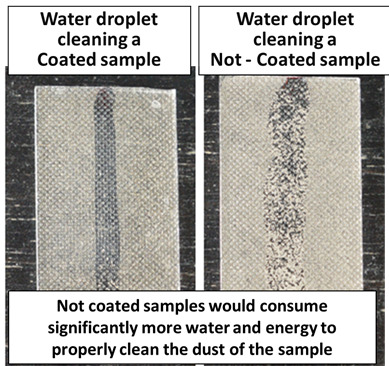


There is a high need for a cost-effective mitigation
strategy to reduce energy losses due to dust
deposition on PV modules. The most common
practice used for cleaning PV modules today is a
manual-water-based cleaning method, which also
to the global water crisis. Anti-soiling coatings (ASC)
is one of the most cost-effective universal solutions
to mitigate dust. It is applied on the top surface of
the PV module to mitigate dust deposition.
As these coatings are applied on the outer surface
of the PV module, durability of these coatings
become an essential factor. Among the many
commercial anti-soiling coatings available in the
market, we had tested 4 commercial hydrophobic
anti-soiling coatings (catered to PV application)
under outdoor field exposure in warm and humid
climatic condition.
We saw that all coatings degraded in 3 months.
We further identified the stressors which degraded
anti-soiling coatings under field conditions.

The factors that degraded the ASC are listed below :
Rainfall- Frequent cleaning (manual or natural cleaning by rain)
abrades the ASC, which was identified as a statistically significant
stressor in both outdoor field exposure test and indoor individual
stress tests. The effect of frequent cleaning on the field was more
severe, as, in the real field condition, combination of
stressors acted concurrently.
Acid rain- Signatures of acid rain were seen in outdoor field
test samples. The laboratory acid rain/acid immersion test showed
that hydrophobic coated samples became hydrophilic in 220 min of acid
immersion.
Combination of UV exposure and condensation- We saw that the effect of the
combination of UV
exposure and condensation shows a higher rate of degradation than the individual
stress test of only UV
exposure and water immersion. This indicates that combination of stressors, also
seen in field
exposure, degrades the coatings at significantly higher rates than individual
accelerated stress test.
Understanding the factors that degrade ASC on field, can be used in developing a
standard test sequence,
which will act as a baseline for the present commercial antitisoiling coating market
and will also help in the
development of durable antitisoiling coatings. For more detailed information, please
refer to the paper -
Sonali Bhaduri, Ajeesh Alath, Sudhanshu Mallick, Narendra S Shiradkar and Anil
Kottantharayil.


